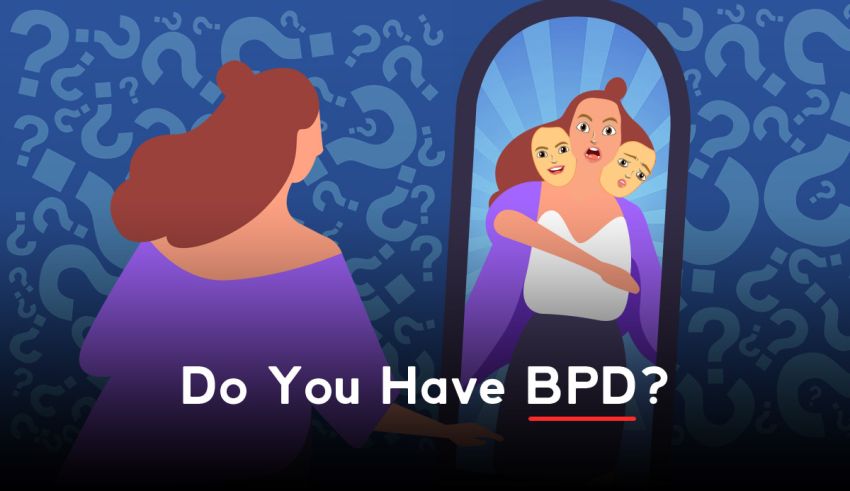
A Reliable Quiz: Do You Have Borderline Personality Disorder?
The comorbidity of BPD and its similarity with bipolar mood disorder complicates the diagnosis process. However, the questionnaire here utilizes the latest findings and analyzes 20 factors to deliver accurate results.
Sings You Have BPD
Having 5 of the 9 borderline personality disorder traits makes you a BPD patient. The traits are fear of abandonment, unstable relationships, identity disturbance, impulsivity, suicidal behaviors, affective instability, chronic emptiness, irritability, and paranoia.
Self-Report the Symptoms to Get Accurate Results
The high-functioning borderline personality disorder allows you to report and evaluate your symptoms. The questions help you go through a semi-clinical process to reflect on your emotions and experiences.
Things the Borderline Personality Disorder Test Considers
The questionnaire is based on the Diagnostic and Statistical Manual of Mental Disorders. So, it considers the four major symptom categories to decide if you have BPD: emotions, thoughts, relationships, and behaviors.
#1. Emotional Stability.
A person with a bipolar personality disorder has a hard time maintaining emotion. As Dr. Ramani Durvasula explains, “BPD is unique for how unstable the person is. They will go from angry to sad to cheerful in an hour. You will not see that kind of emotional instability with any other PD.”
So, one of the things that the quiz looks for is how stable or unstable your feelings are. We have specific questions that stimulate various situations, and let us analyze your reactions.
#2. Disturbed patterns of thinking.
It’s pretty common for a BPD patient to also struggle with trust issues. Under intense mental pressure, they might also face paranoia and other abnormal thought patterns. So, the quiz wants to ensure your thoughts don’t include such concerning patterns. Dr. Ramani says, “The technical term for this is transient stress-induced paranoid ideation… It is a fancy way of saying that under stress, a person with borderline personality disorder experiences frankly paranoid symptoms like other people are going to harm them; a sense of conspiracy; and they may actually hear voices or see things.”
The quiz will look for dissociative and paranoic symptoms to finetune the results. If you’re curious about your thinking patterns, you can also take our Derealization Test to help identify any DRDR signs more accurately.
#3. Impulsive behaviors.
People who ask, “Do I have BPD?” should review their impulsiveness for a reliable answer—the same thing that the quiz does. We analyze your traits and reactions in different settings to estimate your spontaneity. However, it’s noteworthy that people with borderline personality disorder often engage in dangerous activities due to their impulsivity.
#4. Relationship patterns.
As doctor Todd Grande explains, there’s this love-hate cycle in the relationships of a BPD patient. It includes idealization and devaluation of others with an unpredictable pattern. Due to the constant and sudden mood swings, it’s challenging for a borderline patient to maintain a stable bond—especially a romantic one. That’s why the quiz wants to dive into your traits and decisions in your affairs and interpersonal interactions to see if you have the disorder or not.
The Only Online Test That Distinguishes Between Bipolar and BPD
While bipolar is not a personality disorder, it overlaps with BPD; and the two conditions are considered comorbid. So, a person with bipolar one or two might also have borderline PD—and vice versa. However, the good news is that our quiz differentiates between them and diagnoses you with the right condition despite the overlap.
- According to Dr. Grande, four symptoms can help one distinguish between these two comorbid disorders:
- Abandonment issues are often related to BPD and are not as common among bipolar patients.
- Unlike bipolar mood disorder, BPD is usually triggered by relationship stressors.
- Symptoms are chronic emptiness is rare among bipolar patients.
- The frequency of mood change is much higher in borderline personality disorder.
How to Stop Asking, “Do I Have BPD?”
You should get a clinical diagnosis to stop worrying about personality disorders and mental illnesses. However, if that’s not currently an option, try taking a genuine online quiz—like the one on this page. It can act like a pre-clinical test to evaluate your symptoms through a self-report process. If the results are concerning, you can opt to see a psychologist or psychiatrist.
An Anti-Stigma Quiz for People Living with Bipolar Personality Disorder
Unfortunately, the stigma around BPD and the toxic meme culture has made it difficult for the patient to talk about it. People sometimes use the term ‘personality disorder’ to refer to any unwanted action or unpleasant happening. And bipolar PD has become an interchangeable word for any mood swing or unpredictable action.
The good news is that our quiz is 100% bias-free and science-based. We do not judge you for having a bad mood for a couple of days. Plus, unlike most other comparable tests, it doesn’t have a comical theme. So, it’s a serious process with reliable results.
What if the BPD Test Result Was Positive?
You may end up realizing you DO have a borderline personality disorder. But that’s fine. First, you need to remind yourself that it’s not a clinical procedure—and you still need a doctor to confirm the results. Second, there are several treatment methods available for BPD patients. So, no need to worry at all. Here are some of the things you should do if you have the condition.
Seek professional help.
Treatment procedures such as DBT (Dialectical Behavioral Therapy) and CBT (Cognitive Behavioral Therapy) have proven effective in mood management in borderline patients. Talking to a psychiatrist or psychologist could be your first step in starting such treatments and gradually getting in charge of your emotions.
Practice mood and emotion management.
Mood control is a thing. By using the proper techniques, you can be mindful of your sudden swings and don’t let them control your life. Self-awareness is key to conquering your BPD problem. And practice actually makes perfect when it comes to such skills.
Don’t forget that you’re not alone.
According to the National Institute of Mental Health, BPD affects 2.8 percent or roughly 6.5 million adults. So, it’s not a rare condition. Feeling alone or isolated can worsen your situation. But there are several trustworthy organizations and forums full of people just like you. Joining them and meeting individuals with the same struggles can motivate you to keep going and have the support of a community.
Disclaimer
The quiz here is designed for participants with questions like, “Do I have BPD?” in their minds. It is NOT a clinical test, and QuizExpo is not associated with any of the names/organizations mentioned on the page. You should definitely consult a doctor for a clinical test and avoid any self-diagnosis for the sake of your mental health. Please, use the quiz for educational purposes only.































